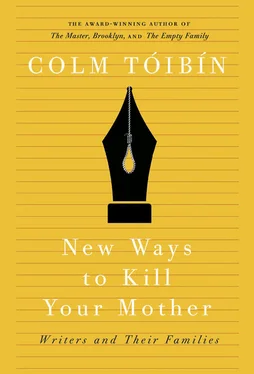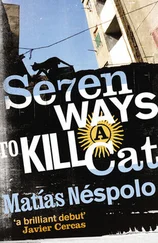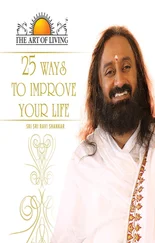She went to her aunt and put her arm around her; and Mrs Touchett, who as a general thing neither invited nor enjoyed caresses, submitted for a moment to this one, rising, as might be, to take it. But she was stiff and dry-eyed; her acute white face was terrible. ‘Dear Aunt Lydia,’ Isabel murmured. ‘Go and thank God you’ve no child,’ said Mrs Touchett, disengaging herself.
Thus it emerges that Mrs Touchett, as well as being an intrepid and amusing aunt, has all the time been a mother, watching over Ralph as he weakens as the book proceeds. Like Madame Merle, her role in a novel that is itself filled with duplicity is dual; the fact that she does not simply play one role, or that the simplicity of her role is so starkly undermined in that scene with Isabel, by allowing the novel to layer and offer density to its own procedures, gives it a powerfully protean dynamic.
In James’s novel The Ambassadors , written more than twenty years later, Lambert Strether appears in the guise of uncle, as, initially, Marie de Vionnet appears as aunt. Thus Chad can play the role of nephew to both and can seem to have an interest in Madame de Vionnet’s daughter. Once again, as the novel develops, James plays with absence. Chad’s father is dead; his mother is alive, but does not appear in the book except as an energy that pulls him towards her. In the empty space left by absent parents, then, it is clear what must happen. The surrogate uncle will fall for the surrogate aunt. And the two young people will find each other attractive. And the novel will, once more, be the story of the further exclusion of the mother, her annihilation all the more dramatic and satisfying because she is so needy.
James has other plans, however, and he plays these out in a recognition scene of exquisite subtlety as Strether, having made a random trip outside Paris, observes two figures in a boat, slowly sees that they have spotted him too; they are not Chad and Madame de Vionnet’s daughter, however, but Chad and the Madame herself. In the way they seek to avoid being seen, everything becomes apparent. ‘This little effect,’ James writes,
was sudden and rapid, so rapid that Strether’s sense of it was separate only for an instant from a sharp start of his own. He too had within the minute taken in something, taken in that he knew the lady whose parasol, shifting as if to hide her face, made so fine a pink point in the shining scene. It was too prodigious, a chance in a million, but, if he knew the lady, the gentleman, who still presented his back and kept off, the gentleman, the coatless hero of the idyll, who had responded to her start, was, to match the marvel, none other than Chad.
Thus once more James has sexualized an aunt. It is as though Henry Crawford came to Mansfield Park in search of Lady Bertram rather than Fanny; or Mr Darcy were found in the countryside in his shirtsleeves with none other than Mrs Bennet, or Aunt Gardiner; or Mr Bingley were found in a carriage with Lady Catherine de Bourgh. In other words, James took what was necessary for a novel in his time to have power and weight — the replacement of the mother by the aunt — and then saw what was possible, the making of the aunt not simply an enabling figure, or a cruel comic figure, or a passive figure, but a highly sexualized woman, and so, within the dynamic of the novel, a figure capable of moving at will from one role to another, causing havoc within the narrative systems created for her.
In both The Turn of the Screw and The Golden Bowl , it is as though the mother never existed, as though the characters came into being by some method specially created by the novelist rather than by nature. She is not an absence; she was never present. She is unthinkable. Instead, a surrogate aunt emerges, who is deeply neurotic in the former book, and oddly nosy and wise in the latter. The children Flora and Miles thus inhabit that rich space made for Victorian fictional characters; they are orphaned, and nothing can happen to them until the aunt figure, in the guise of the governess, arrives, and then everything can happen. In The Golden Bowl , just as Charlotte Stant appears ready to become Maggie Verver’s potential stepmother, by marrying Adam Verver, Maggie’s father, she also becomes Maggie’s rival for the Prince, who is Maggie’s husband. As every other force in the book remains stable, solid, Charlotte is the element who is shape-changing, untrustworthy, duplicitous. Those around her can be released from being contaminated by Charlotte by the arrival of a surrogate aunt in the guise of Fanny Assingham, who will treat the story of the book as story, in the same way as a reader will, but will also be the figure who will smash the golden bowl.
In The Wings of the Dove , Kate Croy goes to her rich Aunt Maud on her mother’s death, her mother having left her more or less penniless, and her Aunt Maud makes her an offer that is outlined in the opening of the book. It is the offer that is at the very basis of the novel from Austen to James. Aunt Maud wishes her niece to be an orphan and wishes to control her life, or manipulate her future. She wants her niece to go and see her father. Kate tells him: ‘The condition Aunt Maud makes is that I shall have absolutely nothing to do with you; never see you, nor speak nor write to you, never go near you nor make you a sign, nor hold any sort of communication with you. What she requires is that you shall cease to exist for me.’
Having given up her father, Kate is now in the hands of her aunt, and it is these hands that slowly mould her and come subtly close to corrupting her. It is her aunt’s will that causes her to behave as she does. Her aunt watches over her possessively, as Aunt Peniston does Lily Bart in Edith Wharton’s The House of Mirth , published three years later. In neither book is the younger woman loved or offered unconditional protection by the older woman; in both books the aunt is manipulative and difficult rather than hospitable to the orphaned niece, or comforting, or understanding. In Wharton’s book Lily Bart is brought to ruin; in The Wings of the Dove Kate Croy is allowed to ruin herself in a much more ambiguous and spiritual way; in both books, the brittle presence of the aunt hovers over the action, darting in and out of the narrative like a large needy reptile.
Into the action arrives the young heiress Milly Theale, whose history, we are told,
was a New York history, confused as yet, but multitudinous, of the loss of parents, brothers, sisters, almost every human appendage, all on a scale and with a sweep that had required the greater stage; it was a New York legend of affecting, of romantic isolation, and, beyond everything, it was by most accounts, in respect of the mass of money so piled on the girl’s back, a set of New York possibilities. She was alone, she was stricken, she was rich, and in particular was strange — a combination in itself of a nature to engage Mrs Stringham’s attention.
Mrs Stringham is, of course, childless, old enough to be Milly’s aunt, and she becomes Milly’s surrogate aunt to match Kate’s aunt in the novel about two women, both orphans, both in the care of their aunts, both moving slowly towards destruction, one of the body, one of the moral spirit.
This idea of the family as anathema to the novel in the nineteenth century, or the novel as an enactment of the destruction of the family and the rise of the stylish conscience, or the individual spirit, comes in more guises than the replacement of mothers by aunts. As Lionel Trilling has pointed out: ‘Of all the fathers of Jane Austen novels, Sir Thomas [Bertram] is the only one to whom admiration is given.’ This idea of the annihilation of the communal and its replacement with the person, and the novel being one of the agents of this, as much as a result of it, comes throughout the century, however, in the guise of mothers fading and aunts arriving. As Rupert Christiansen has pointed out in The Complete Book of Aunts , it occurs in the novels between Austen and James as much as it does in their work. It occurs in the novels of Dickens ( David Copperfield and Little Dorrit ) and Charlotte Brontë ( Jane Eyre ), of Thackeray ( Vanity Fair ) and Trollope (He Knew He Was Right ).
Читать дальше












